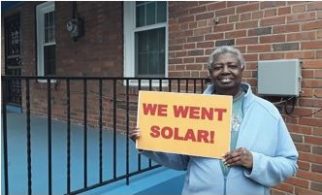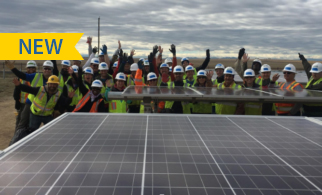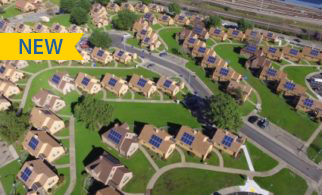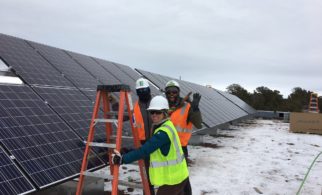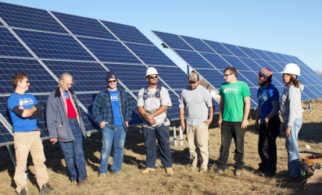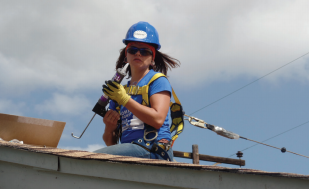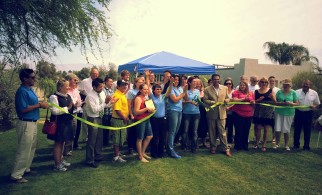Federal Partnerships/Best Practices Sharing
Guiding principles: Community Engagement
Barriers addressed: Compatibility and Integration, Market Forces
In many initiatives over the years, The White House, as well as federal agencies like the U.S. Department of Energy (DOE), the U.S. Environmental Protection Agency (EPA), and the U.S. Department of Housing and Urban Development (HUD), have recognized and voiced the importance and positive impact of low-income solar programs. Dedicated funding from federal sources for low-income solar programs has been largely absent, but a few partnerships have formed to ensure best practices sharing between jurisdictions looking to or in the process of implementing low-income solar programs. Partnerships with federal agencies are valuable because they help inform state- and local-level low-income solar projects and policies. Below are a few of the national efforts underway in support of low-income solar programs:
- In July 2015, the White House, in partnership with the DOE’s SunShot Initiative, announced the National Community Solar Partnership to increase access to solar energy for all Americans, in particular low- and moderate- income communities, while expanding opportunities to join the solar workforce. In July 2016, the White House announced the Clean Energy Savings for All Americans Initiative, which planned to work to ensure that every household has options to choose to go solar and put in place additional measures to promote energy efficiency. To continue along this track, the Administration, in collaboration with state agencies, announced a new catalytic goal to bring 1 gigawatt (GW) of solar to low- and moderate-income families by 2020. In late 2016, the DOE’s SunShot Initiative also launched the “Solar in Your Community Challenge,” a $5 million contest to support innovative and replicable community-based solar business models and programs that will bring solar to underserved communities. The Solar in Your Community Challenge developed a suite of courses and a curriculum that can help guide and inform stakeholders of all levels of expertise to launch a low-income solar project or program successfully.
- HUD’s Renew300 initiative provides technical assistance to educate affordable housing owners about the broad benefits and opportunities that solar energy provides. With updated commitments made in July 2016, the initiative is on track to install 344 MW of solar by 2020, exceeding its goal of 300 megawatts (MW) of solar and other types of renewable energy on federally-subsidized housing.
- Announced May 2016, the DOE’s Better Buildings Initiative’s Clean Energy in Low Income Communities Accelerator aimed to lower energy bills and energy burden in low-to-moderate income communities through expanded installation of energy efficiency and distributed renewables. The Accelerator included roughly $335 million allocated by partners to support access to clean energy for 155,000 low-income homes. Resources from the Accelerator include an Issue Brief on Reducing Energy Burden for Low-income Residents in Multifamily Housing with Solar Energy and the Low-income Energy Affordability Data (LEAD) Tool. In addition, DOE’s efforts to address low-income energy solutions can be found through an Interagency Collaborative on Energy Solutions for Low-Income Communities which established a Library of Federal Resources and Tools. The Library allows stakeholders to catalogue and customize Federal resources to meet their low-income energy needs.
- The DOE’s Better Buildings Challenge provides support to businesses, manufacturers, cities, states, universities, and school districts that commit to improve the energy efficiency of their portfolio of buildings by at least 20 percent over ten years and to share their results, Many participants have made strides; one example is the Housing Authority of the City and County of Denver, which partnered with a number of organizations to both develop and finance a project that brought photovoltaic solar to 387 affordable housing buildings throughout the city.
- DOE and HUD partnered with the U.S. Department of Education in developing STEM, Energy, and Economic Development (SEED): Coalitions for Community Growth, an innovative place-based initiative to create economic opportunity and energy-literate communities. SEED’s focus is on inspiring public housing residents around the country to pursue careers in energy, and preparing them to join its labor force. The SEED initiative links existing federal investments and activities to local coalitions to expand or launch programs based on energy literacy, STEM Education, and job-driven skills training.
- There is growing interest in using federal energy assistance funding for low-income solar installations, as described in a recent George Washington Solar Institute report. See this page for state examples.
